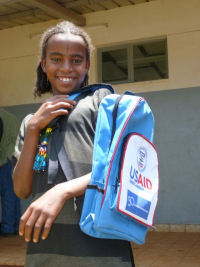Transforming Education for Adults and Children in the Hinterlands (TEACH II)
See also: Crosscutting Issues
Date of Operation: 2009 – 2014
Primary Implementing Partner: Pact Ethiopia
Implementing Partner: Pact Ethiopia
Other Implementing Partner(s): Kalem, Amhara Development Association, Oromia Development Association, Action for Development, Adult Non Formal Education Association in Ethiopia, Relief Society for Tigray (REST), and Bench Maji Development Association
Regions of Operation: Afar, Amhara, Benishangul-Gumuz, Gambella, Oromia, SNNP, Somali and Tigray
Goal:
Increase access to education of both children and adults in disadvantaged areas and improve the capacity of woreda education officers in planning and managing non-formal education programs for pastoralists and remote communities.
Objectives:
- Provide alternative basic education for out-of-school children
- Administer an adult functional literacy program
- Increase the capacity building of the district education offices
- Include curriculum with a focus on water, sanitation and health
Description:
While the enrollment rate for primary school is over 94 percent, many school-age children in more remote rural areas continue to face access issues and do not attend school regularly as schools are too far away and children are needed to assist with household tasks, such as retrieving water. Furthermore, about 57 percent of adults lack basic literacy skills. The project models a unique approach to providing education to the hardest-to-reach populations in Ethiopia’s pastoralist and nomadic, resettlement and food-insecure areas, by using low-cost construction materials and drawing on community labor and contributions to construct alternative basic education centers. The project then provides short-term, intensive training to facilitators drawn from the local community or surrounding area. The students study at an accelerated pace, covering the equivalent of four years of primary school in three years. These alternative basic education centers also serve as centers of learning for functional adult literacy. TEACH advocates that education can reach the unreached through three mutually reinforcing pillars of capacity building—educating children and youth, educating the parents and community members that support them, and educating the district education office that are responsible for the provision of education.
Expected Results:
- Establish 301 new alternative basic education centers (ABEC), reaching 90,300 children (46 percent girls) with quality, non-formal education services. These ABECs will also provide adult functional literacy programs (50 percent women).
- Train more then 700 facilitators and at least 43 ABEC supervisors in adult teaching techniques and methodologies
- Distribute non-formal text materials that meet quality standards
- Strengthen the capacity of 1,100 education officers in over 200 districts
- Produce capacity building materials that focus on planning, managing and supervising adult literacy programs.

